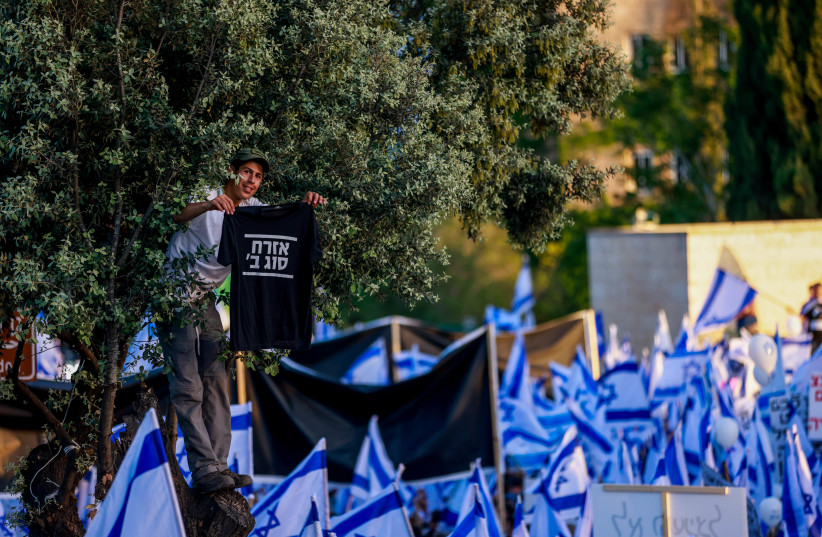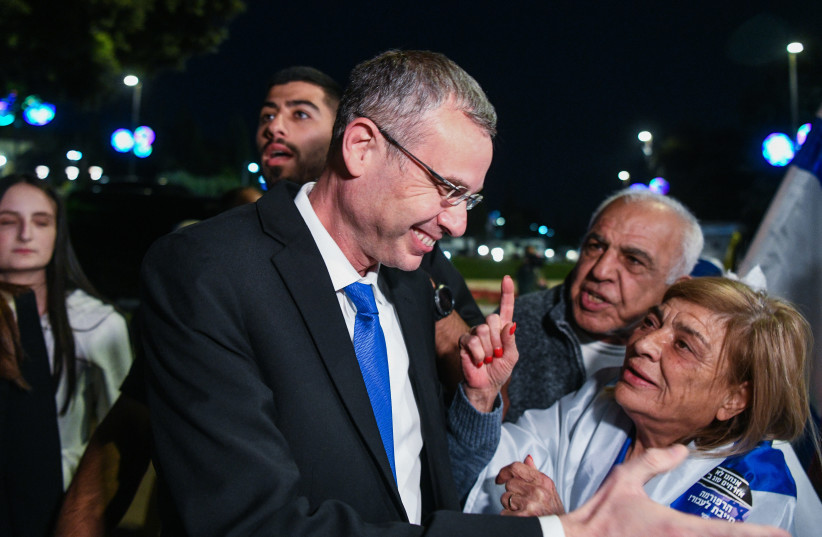As many as 200,000 people gathered Thursday evening outside the Knesset in support of the judicial overhaul, with various government ministers and coalition MKs, including Justice Minister Yariv Levin, in attendance.
Other officials in attendance included Finance Minister Bezalel Smotrich, MK Israel Katz (Likud), Levin, who is leading the reforms, Constitution, Law and Justice Committee chair MK Simcha Rothman, among others.
“The people demand judicial reform," was the slogan under which the protest was organized, and attendees picked it up, chanting it throughout the night.
Protesters expressed mixed opinions about the judicial reform negotiations. Some, like Elbaz from Hebron, were happy about them, telling the Post that “we aren’t alone. We need to talk.”
Others, like Kobby, a hi-tech worker from Beersheba, said that “The negotiations are okay; but I don’t favor them too much. After the election, we are the majority, and the government has to go with our wishes. We don’t need to wait for the other side... In the past, they didn’t ask our opinions.”
The crowd, enthusiastic and eager to make their voices heard, were mostly calm as the speakers gathered - and no confrontations with the police were reported.
"The High Court doesn’t represent me," said Kobby. "It doesn’t represent the majority.”

The protest seemed to be made up of a predominantly religious crowd – from the naked eye it appeared that almost every male was donning a kippah - and the Israeli flag was displayed prominently alongside the yellow and blue Moshiach flag popular with the Chabad movement.
Also of note perhaps, was the large number of children accompanying their parents as they protested.
Elbaz, with his children, said that he brought them with “to teach them about civil service... How to be citizens.”
Despite the majority being so, not all of those participating were religious. To this end, Meir and Ilana from Netanya told the Post that the cause isn’t about whether you are religious or not, but rather that it’s about “not being second-class citizens.
"We aren’t second-class citizens," Ilana said. “We feel we have the mandate to make change. And the High Court acts without anyone's input.”
The sounds of the protest were varied, switching between the blasting of Israeli music and the sounds of selichot and other Jewish prayers, with many prayer groups popping up along the sides of the blocked-off streets.
"Look how many we are. We are the people," said Smotrich to the listening crowd. "The people want the reforms. They will get them.”
Meanwhile, Justice Minister Levin was greeted with great fanfare, with music and chanting in support of the reform that he is spearheading, drowning out his words in parts.
He spoke disparagingly about the High Court, saying that the government has the mandate to make a change.
“We want a court for everyone… not for half the public," he said, adding that "over two million people voted for reform half a year ago.”
When he addressed Attorney-General Gali Baharav Miara, her name was met with a shower of boos, and he vowed to end her control, demanding that someone “show me a democracy where the legal advisers decide instead of the government.”
On the current negotiations, he told the crowd that “we have the chance to reach an agreement. Agreement means real negotiations and also a willingness to accept large parts of the reform and not to hold discussions for over a month and say ‘no’ to every proposal.”

Missing from the protest, however, was Prime Minister Benjamin Netanyahu, and protesters noticed his absence, chanting “Where is Bibi?” at various points throughout the event.
Despite the success of the event, some voiced complaints about the way in which it was organized with one attendee from Jerusalem, Yehezkiel, saying that it was extremely crowded, and "very poorly managed. There’s only one exit and entrance, creating a bottleneck to get in.”
He told the Post that he believes in the reforms and thinks it is “ridiculous that people that had the plurality in the vote have to come out and protest to have their voice heard."
Despite the many sectors of Israeli society participated in the protest, members of the haredi population were far and few. This may be due to an editorial in Yated Ne’eman, a leading haredi newspaper, in which they called on members of the community not to join, going as far as saying those that do are “not part of our community… his citizenship in the house of God is revoked.”
Protest organizer MK Avihai Boaran (Likud) spoke to Maariv ahead of the protests, explaining that “an entire [political] camp cannot live with the knowledge that it is worth less. If there is no [judicial] reform, it means that our vote in the ballot box is worthless. We are the majority at the ballot box but we cannot really run the country.
“This reality must change. The national camp is also allowed to have a share in the management of state affairs. We are tired of being second class.”
Eliav Breuer contributed to this report.
